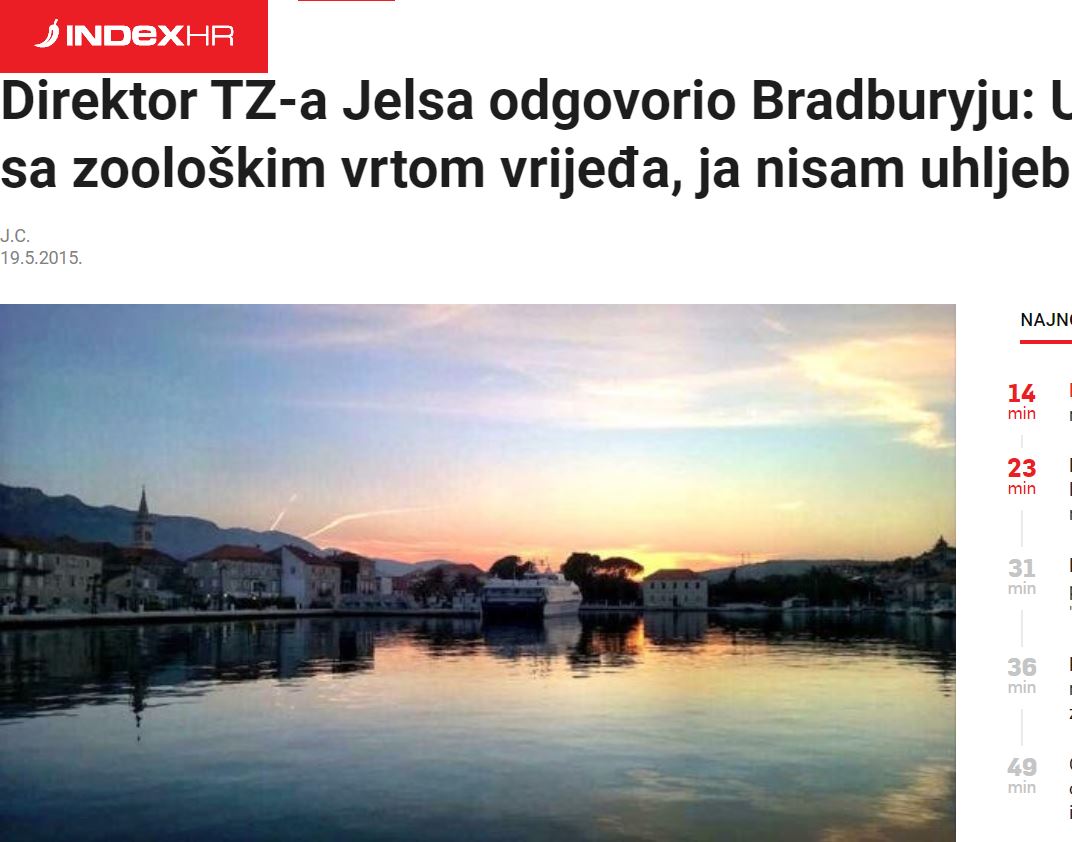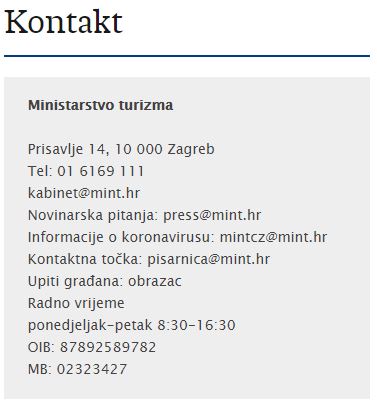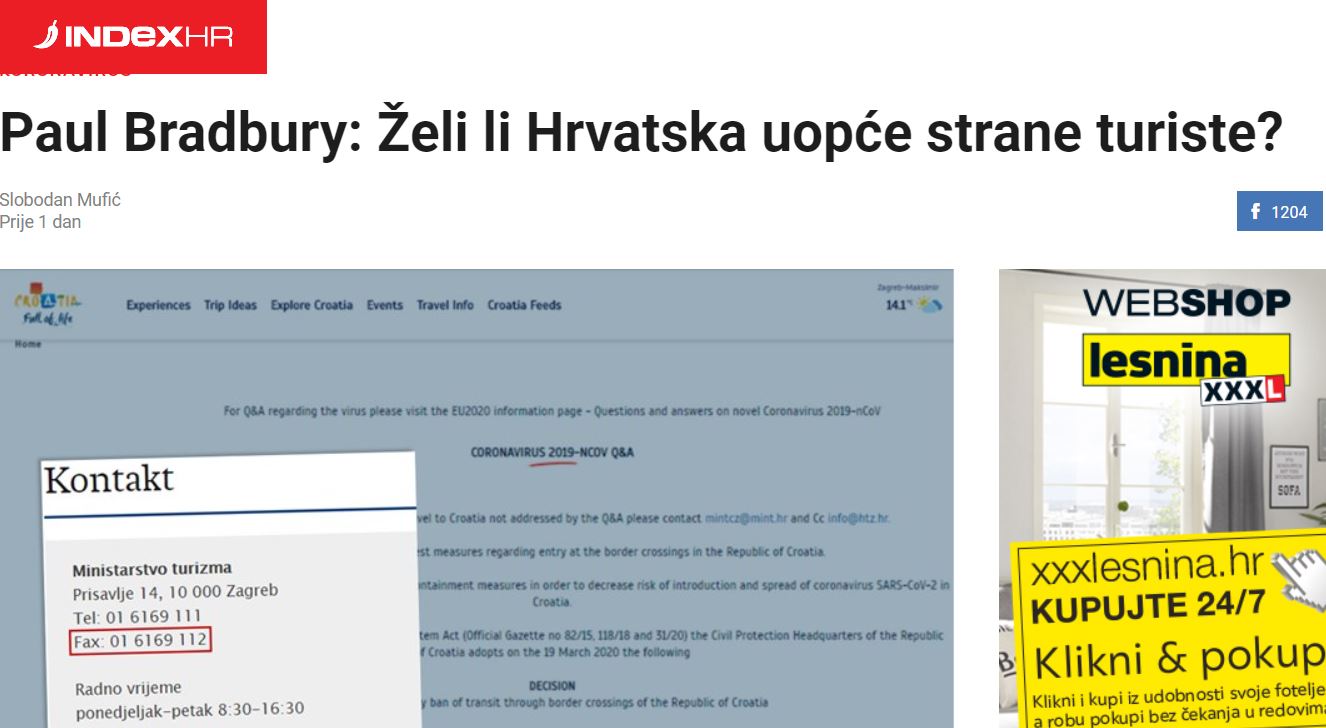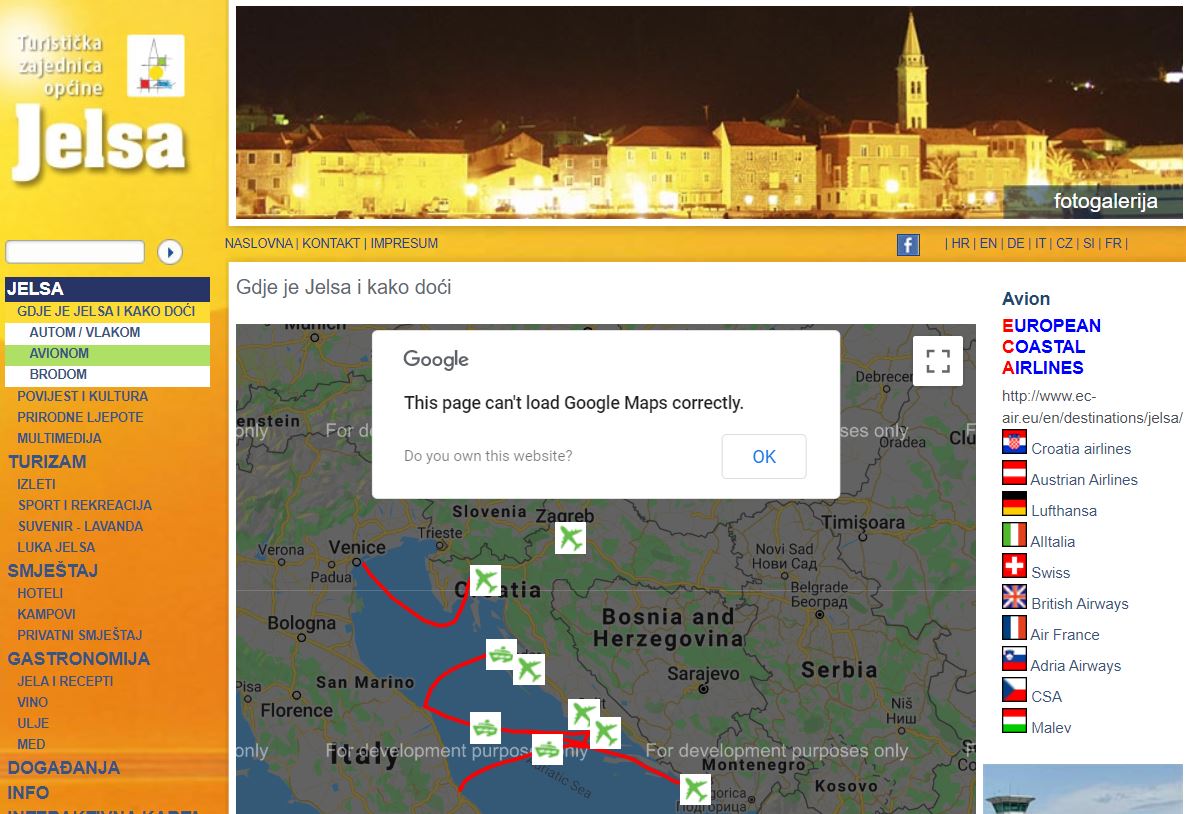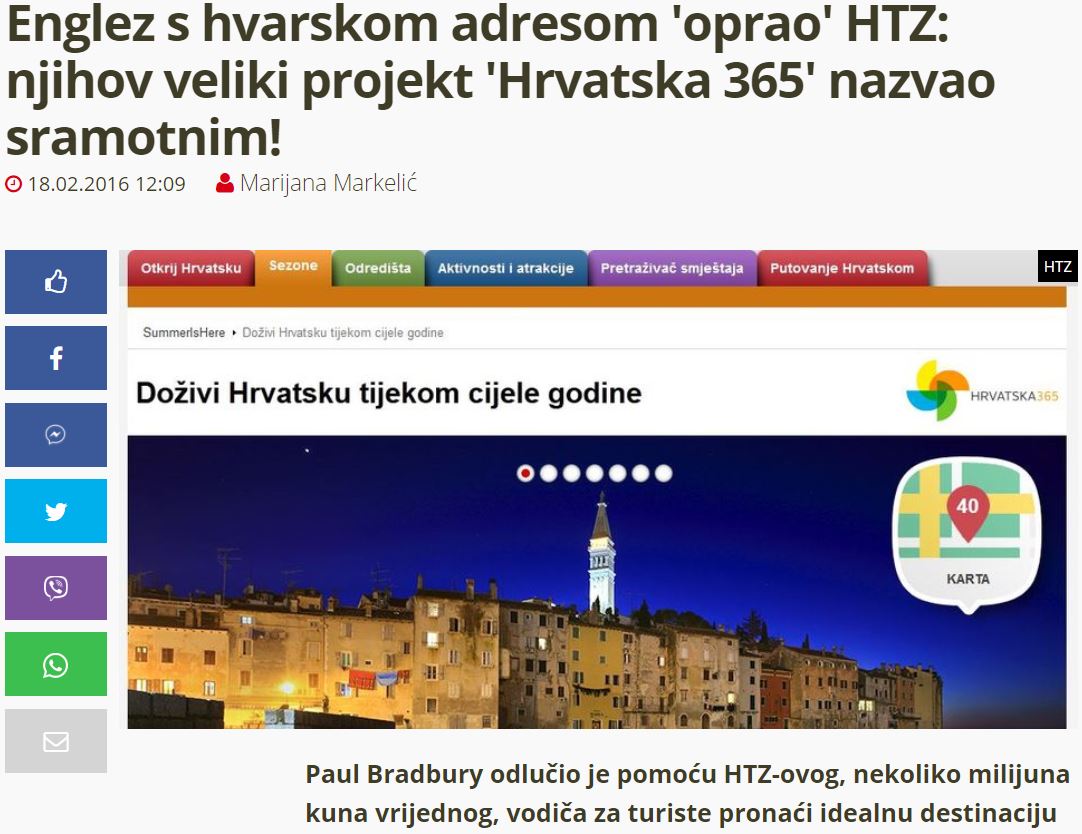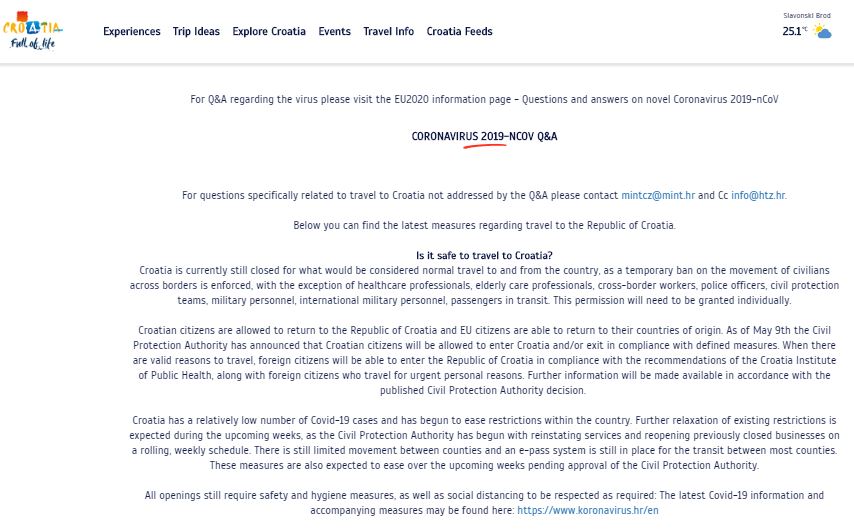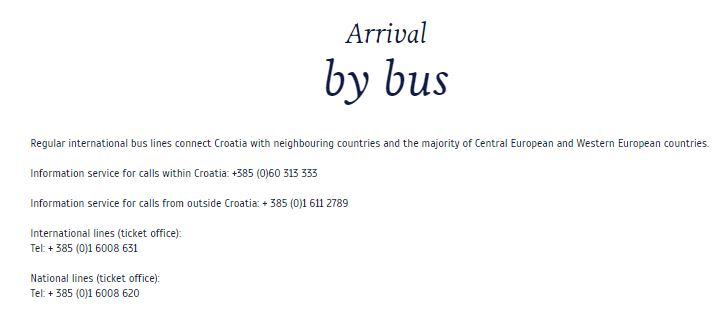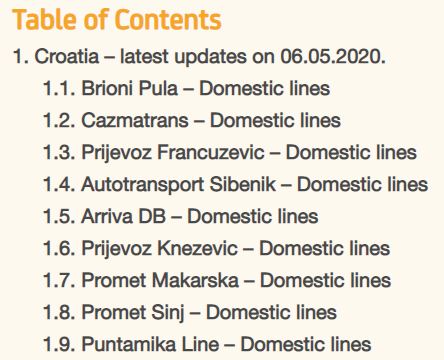Original Croatian Product Distributed in Hospitals and Health Institutions
As Poslovni Dnevnik/Lucija Spiljak writes on the 8th of May, 2020, a group of a dozen innovators who have come together owing to the internet portal Pandemija.info, volunteer day and night to make Croatian respirators for the protection of health professionals, and this Croatian product is perhaps best known as CroResp.
"We designed a respirator that protects the whole face, and most importantly - the eyes and the airways. The respirator is made of a diving mask, an adapter and a virus filter ", explained Dr. Ivor Kovic, an emergency medicine specialist and the initiator of both the portal and the initiative. He stated that despite the fact that they don't have official certificates for the use of these respirators in protection against coronavirus, they believe that this solution provides people with greater protection than surgical masks in combination with protective visors.
Hundreds of healthcare professionals have so far requested this Croatian product, and a large number are already being distributed in Croatian hospitals and institutions.
"Although the situation is calming down in Croatia, it's important for medics to be looked after properly because, regardless of the number of patients, they can still become infected and spread the infection without proper protective equipment," warned Kovic. Most orders for this innovative Croatian product are coming from Zagreb, Osijek, Rijeka and Split, and the feedback from doctors and nurses who already use them has been positive.
The team has been counting orders in the thousands, while they also launched a campaign through the crowdfunding platform Croinvest and the association Helping is always in/ Pomaganje je uvijek in. They collected more than 150,000 kuna donated by the citizens, which was needed to supply the first 1,000 health workers with these respirators. The campaign is still ongoing, and at the time of writing, more than 195,000 kuna for this Croatian product has so far been raised.
Helping colleagues through the Pandemija.info portal
"It's uncertain how the pandemic will develop, and CroResp has the ability to protect healthcare workers from the virus in the long run," said Kovic, who went on to talk about how abd where it all started.
Seven years ago, he and his wife, who is also a doctor, moved to the UK where they worked together in various hospitals, and when he temporarily returned to Croatia, the number of infected people began to grow, and examples from neighbouring Italy showed what was happening with the collapse of the health system there. When the couple landed, they had to go into mandatory self-isolation, and Kovic was thinking about how to help his colleagues during that period. This is how the Pandemija.info portal was created, which he started up with several friends and associates.
''We've published educational materials and fast, verified, accurate and professional information for our medics who are under pressure and who need proper preparation. We soon published about 20 different summaries, posters, infographics, with information on the standard of masks, how to use them properly etc. Colleagues from Croatia and abroad started sending us materials, we followed everything that was happening in the world and realised that there was a global lack of protective equipment,'' explained Kovic.
The creators of this Croatian product work entirely voluntarily
The work of this Croatian team is completely voluntary and open, so they're not thinking about patenting the product or creating a business from this situation, because at the same time, they're actively fighting against those who are trying to use the current situation for their own profit.
"From the beginning, we knew that the dynamics of this would depend on what kind of support we will have, what kind of interest there will be and how we will be able to finance it. In the end, it happened that we didn't have any official confirmation; we're not an association and we don't have an account, but we have people who write to us every day and ask for respirators. We couldn't leave them stranded when we'd already 'tickled' them with the fact that such a solution exists,'' he explained.
For more on coronavirus in Croatia, follow our dedicated section.
South Korean SRT Tourist Magazine Places Croatia, Rab in Top 8 Destinations
The coronavirus pandemic has been causing a plethora of issues for countries which primarily rely on tourism for their economies, and Croatia, in which tourism accounts for about 20 percent of GDP, is no exception. The South Korean SRT tourist magazine, however, isn't letting the pandemic get in the way of them praising the country.
As SEEbiz writes on the 9th of May, 2020, the South Korean SRT tourist magazine, published by the railway company of the same name, Super Rapid Train, has included Croatia and the island of Rab among the TOP 8 destinations in the world in its May publication.
The article about the island of Rab points out that in a survey conducted by SRT magazine, many readers chose Croatia as their number one destination. It is also stated that Croatia is a country with more than a thousand islands, including the island of Rab with its exceptional cultural heritage, which is often called the "emerald island" due to its unique blue-green colour. According to the Soyth Korean SRT tourist magazine, the best time for South Korean tourists and readers to visit Rab is the period from June to September.
"After a great report on Croatia in the March issue of SRT, this time the island of Rab has found itself in the company of seven world destinations along with Ica and Paracas in Paraguay, Wellington in New Zealand, Macao, Bettmeralp in Switzerland, Camino de Santiago in Spain, Hawaii and Taiwan,'' said the director of the Croatian National Tourist Board Kristjan Stanicic, adding that at the moment every positive announcement in foreign media contributes to maintaining the image of the Republic of Croatia as a desirable and safe tourist destination worth visiting.
It's also worth mentioning that SRT, as the operator of the super-fast train on the Seoul route, which has a massive ten million inhabitants, and Busan, which has five million inhabitants, transports around 2.5 million passengers a month.
Make sure to follow our dedicated travel page for much more on Croatian destinations.
Brač Residents Battle COVID-19 Outbreak — At Least Those Who Stayed
May 9, 2020 — The island home of olive picking championships, swimming boars, and Boris Johnson on a bicycle has a new guest: the coronavirus. The unwelcome intruder on the island of Brač sent locals scrambling for safer shores just before authorities limited movement.
Brač, off the coast of Split, became a COVID-19 hotspot overnight when 22 new infections emerged on Friday, up from zero. More may be on the way, with 54 reported contacts found and close to 100 tests conducted.
The Civil Protection Directorate decided on Saturday Brač would spend another two weeks adhering to strict measures, including “stay at home” rules and limited travel, which are being lifted across the rest of Croatia.
The spike in infections reportedly sent islanders headed for the mainland Friday and Saturday, as rumors of a quarantine spread. A video shot by N1 reporter Hari Kočić shows the ferry bound for Split packed, with several cars left in the lurch.
Bijeg s Brača nakon što je objavljeno kako bi otok mogao završiti u karanteni? Nisu svi uspjeli stati na trajekt. Mještani kažu kako su bijesni jer su se držali svih mjera, a sada ce ponovno biti zatvoreni! #n1info #korona pic.twitter.com/HNFV0buTSo
— Hari Kočić (@HariKocic) May 8, 2020
“Escape from Brač after it was announced that the island could end up in quarantine?” he wrote. “Not everyone was able to get on the ferry. The locals say they are furious because they have adhered to all measures and will now be locked up again!”
Ivana Marković, Mayor of Supetar on the island of Brač, asked the authorities to send professionals from Zagreb to replace the local Civil Protection Directorate. The mayor is herself in self-isolation after finding herself two degrees of separation from patient zero.
Brač was already battling to keep what’s left of the tourism season alive while also easing life for locals. The island is home to some of Croatia’s more picturesque vistas, including the Zlatni Rat beach.
It’s also been at the epicenter of the debate over smart development, with some municipalities nixing the creation of new tourism apartments.
Marković called for a freeze on ferry ticket prices, keeping the lower winter rates.
The island’s emergence as a new coronavirus epicenter shows the precarious balance Croatia’s Civil Protection Directorate seeks as it loosens restrictions.
“Let this example be a lesson to us,” Health Minister Vili Beroš said on Friday. “There is no relaxation. We must continue to be careful and keep our physical distance, adhere to hygienic measures.”
Brač’s “patient zero” was a local returning from hospital for non-coronavirus issues and reportedly required care at home, hence the high number of contacts.
Trip Report of Belgian National to Hvar by Car on May 7-8, 2020
May 9, 2020 - Driving through the EU during a pandemic, a trip report from Belgian national Didier van Bellinghen who arrived on Hvar yesterday.
A story which I am sure will be of interest to many... Reproduced in full.
As countries prepare for the post corona era and loosen measures step by step, I needed to consider to travel back to Croatia and start organizing for the season. Last November, we travelled back to Belgium after another great tourist season on Hvar and we were still in Belgium when the pandemic broke out. The plan was to travel back to Croatia at the beginning of April but that was not an option anymore with the pandemic being at his peak. Now that we’re allowed to open our resort and beach bar again in a few days, I decided to travel to Croatia by car.
I can hear you thinking… how did he manage to travel all the way from Belgium to Croatia when people are restricted to stay at home and are not allowed to leave their own county or town.
It’s a combination of several things:
- I have a registered residence on Hvar.
- I have a registered business on Hvar, Castaway Hvar.
- My company car is registered on Hvar.
I also have a registered residence and a registered business in Belgium which would allow me to travel back and forth if there would be the need.
So how was my experience traveling across Europe during corona? Well, it was much more relaxed than I imagined. Before you start dreaming, do know that I had all required documents and that I did the necessary research before to do so.
Besides the border controls, I expected some random police controls on the roads as well so I contacted each country I would pass and informed myself what documents were necessary to travel across all those countries. For the countries where I would travel through only such as the Netherlands, Germany, Austria & Slovenia, a valid residence card was enough. For Belgium and Croatia, it was a combination of all documents that gave me the opportunity to leave Belgium and set foot in Croatia.
And so I left on May 7th. I expected border controls between every country but to my surprise, not every country had border controls in place. An overview of the borders and what documents they asked me:
Belgium – Netherlands: No border control
Netherlands – Germany: No border control
Germany – Austria: Border control – They asked my ID card and my Croatian residence card
Austria – Slovenia: Border control – They asked me my ID card and my Croatian residence card
Slovenia – Croatia: Border control – They asked me my ID, my Croatian residence card and checked my business registration documents
But don’t be fooled. On top of the border controls, the police also organizes random mobile controls. I encountered 5 police controls: One in Belgium and one in Germany but on the opposite side of the highway. The third one was on the Croatian highway, on my side of the highway. The police officer asked me my E-pass (A pass that is delivered by the Civil Protection Headquarters or border police when you can present them a good reason to travel between counties and/or to the islands) The 2 last police controls were at the ferry ports. One in Split when embarking and one in Starigrad when disembarking.
When you have a good reason such as a residency / business in any EU member state, you can travel ‘home’ and you are allowed to cross the countries in between. Do your research because every country has it own rules, especially when your residency is in that country.
In my case, I was allowed to leave Belgium for work. I could cross the Netherlands, Germany, Austria and Slovenia without any problem but without any unnecessary stop. I stayed on the highways.
Note that all restaurants are closed at the moment in all those countries. You can get some snacks & drinks at the fuel stations but prepare enough food for your trip.
In Croatia, you will get a pass (propusnica) at the border and the following conditions if you plan to stay longer than 72 hours:
1- You have to travel to your residential address within 24 hours
2- You have to use the highway and travel directly to your address
3- You need to stay in self-isolation for 14 days at your home
4- You need to contact the local police at arrival
5- You need to contact a local epidemiologist at arrival and report your health status regularly.
I arrived on Hvar on May 8th in the evening and the next day, the police already came to control if I was at home.
I want to conclude with this: This is my situation at this moment and I only report how my experience was. Things are changing daily so the most important thing is to do your research if you have similar plans. I seems all pretty frightening but if you do your homework and you have all the necessary documents, it will all go very smoothly as the police, border patrol and Civil Protection Headquarters were very friendly and helpful in my experience.
The opening of the EU borders is a hot topic at the moment. And Croatia is considering to stop the need of a pass. So it might be a lot easier to travel across EU soon anyhow.
Good luck!
For the latest on the coronavirus crisis in Croatia, follow the dedicated TCN section.
TCN Put Me on Corona Gardening Leave: Part 2
May 9th, 2020 - In a series of articles on Total Croatia News read about how one of the authors decided to spend her corona-caused gardening leave - actually gardening. Today, you can find out more about how the soil was prepared and seeds sowed (you can read the first article in the series here).
If you know anything about gardening or plants in general, after having seen my photos and reading my description of the soil in which I planned, to put those seeds, you must've asked yourself a version of this question "Is she insane!?!?", followed by "Well, nothing is coming out of that horrible soil, she's working for nothing here..."
Well, allow me to comfort you: I know. I know that there's no way anything would succeed in such bad soil, no matter how many days I spend taking rocks out one by one by hand. And, coincidentally, I have exactly what I need to turn my soil into normal, fertile soil. I have compost which has been created in my back yard. You might've noticed in the previous article a large, blue barrel in the corner of my yard (you can also see it in the first photo in this article), that's where the compost gets made. We've been collecting our biodegradable waste for years, much longer than the city of Zagreb has had an organized collection of such waste in brown bags. During everyday cooking, the biodegradable waste gets deposited into a used ice-cream container (of course you can purchase a container just for that, the only requirement is for it to have a decent seal of the lid, but if you continue following this series you will discover that it's important to me NOT to buy new stuff if at all possible, rather use the stuff already lying around and repurpose it if at all possible). The container is in the fridge and its contents get dumped into the blue bucket outside every couple of days. After the mowing, that's where the grass also goes, the leaves from the trees in the autumn and any other biodegradable waste which we happen to have during the year. The bucket has a small door near the bottom, and that's how we take the compost out, hi-quality, perfect natural compost, ideal for the grass I keep mentioning or some of the herbs I regularly have on my shelves. This year, obviously, most of my compost went into the garden. I can't even tell you how much of it we took out of the bucket and put into the soil, but you just have to take my word when I tell you it was a lot, and that I really believe we won't have any problems with the soil quality after that.
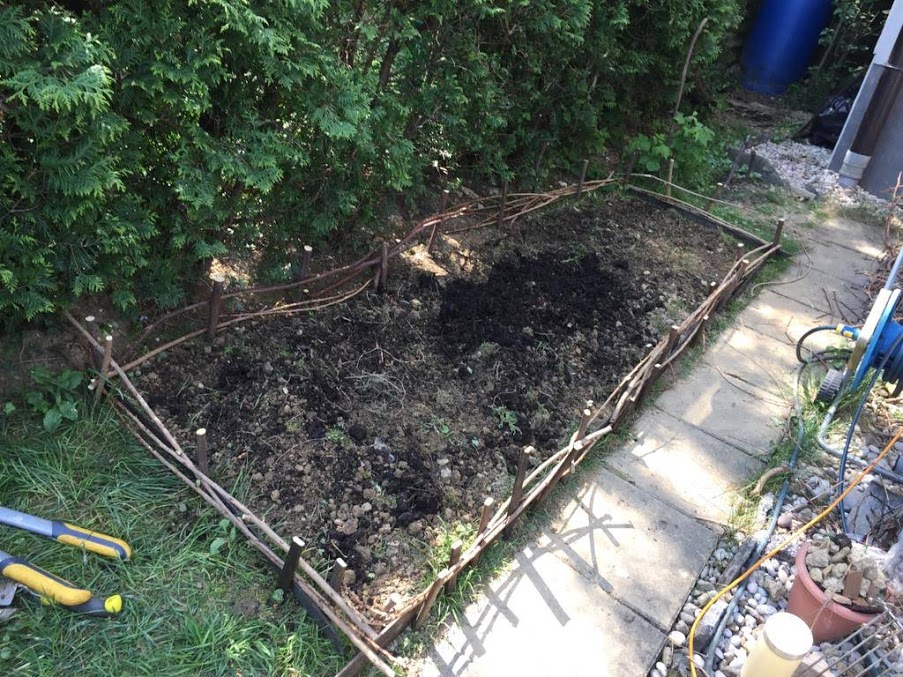
And after having dropped all of that compost, chopped it up and prepared the soil nice and neatly, of course, the soil level rose a bit and it started looking like the soil would get washed away, onto the tiles just below it. I have to say I anticipated that, so I knew in advance a little fence would be required to prevent that from happening. Good thing I still have a lot of leftovers from a former fence I needed to take down, and a partner who owns an electric saw and isn't afraid to use it. We built the little fence fast enough, and I'm still proud of it - and happy to report that it was able to do its job through the heavy rains that have fallen in Zagreb since, after a long drought.
I mentioned in the previous article that I've purchased parsley, carrot, swiss chard, spinach, rocket and zucchini seeds. Parsley doesn't go into this little patch of garden, it is already growing nicely in a separate container where I have my herbs, where this year it will hang out with some lovely basil. They're in the pot together, I've used some leftover nylon to build them a little greenhouse and they're doing OK.
That leaves five species, meaning I need to create 5 sections in my garden. It took some drawing and calculating and tailoring, but eventually, I settled on this plan:

(This is exactly how a normal person would do their plan for their 3 square meters garden, right?) The zucchini needed to go to one of the edges, so if I get any zucchini, they can grow partially on the outside as well. I concluded that the carrot should be by the hedge, and I'm entirely certain there was a reason why I wanted the spinach to be where it is in the drawing, but I can't remember that now. The rocket and swiss chard positions have been determined completely randomly. I measured my little garden, partitioned it using the already-mentioned pieces of the fence into even smaller parts and carefully, according to the instructions, sowed my 5 vegetables.
And that should be it, right, the only thing left for me to do is water the garden and wait for the plants to start appearing. Or can I think of something else which will improve their chances? Read in the upcoming article.
Why Highlighting Uhljeb Brilliance is More Depressing than Clickbait Fun
May 9 - Highlighting uhljeb brilliance and official incompetence in Croatia may look like good, clean clickbait fun, but it is actually quite a depressing part of the job.
Croatia is an incredible country, and one which would be ten times more incredible if it was run by competent officials who had the interest of citizens and pride in their jobs at the core of everything they do. There are occasional glimpses of what Croatia COULD be like - check out the outstanding response to the corona crisis from a health perspective by new health minister Vili Beros as a case in point. But such examples are lamentably few, and citizens have come to accept that things will never change, and Croatia's destiny is one of corruption and nepotism. Citizens do not take to the streets to protest in the same way they do to welcome returning sporting heroes. But they do protest in silence. On the streets of Frankfurt, Stockholm and Dublin. The protest of emigration.
As someone who has chosen the opposite emigration direction, I have a vested interest in a better Croatia, and one of the core principles of TCN is to celebrate the little guy while also providing constructive criticism to certain situations.
Inevitably, and given the enormous frustration at seeing so much potential of a better life for local people squandered in the interests of greed, coupled with incompetence and indifference, that constructive criticism includes publicly highlighting incompetence in the hope that public pressure can achieve what cannot be offline.
It is how I heard the word 'uhljeb' for the first time five years ago, through an Index headline from a tourist board director who has since moved on telling me that he was not an 'uhljeb'. Whatever that meant, and I had to take to Facebook to ask my Croatian friends for an explanation.
The topic of the story was the bus and ferry timetables advertised by the tourist board of Jelsa in 2015, which were 7 months out of date. I wrote a half-amusing blog on Total Hvar, then was shocked to see the story appear on Croatia's most popular portal Index.hr an hour later. The next day, new bus timetables were displayed in the Jelsa Tourist Board office. Effective change. But how sad it took a foreigner to write a blog that was picked up by the national media, rather than have someone do their job.
And so to yesterday, and something truly incredible. Updated Jelsa bus timetables was one thing, but managing to encourage the Ministry of Tourism to upgrade their contact info on its homepage from the humble fax machine to not one but four email addresses was seismic, one of the results from my article a couple of days ago Does Croatia Actually Want Tourists? How the Competition is Updating Tourists.
Of course, the catalyst once more was the might and reach of Index, which ran the story yesterday morning. The ministry went faxless an hour later.
And if Index, or some other strong Croatian media, decides to get involved, that puts the incompetence not only into the Croatian language, but also into the Croatian media space, so more people notice. And so there is more chance that it gets fixed.
Five years ago, an Index article got the Jelsa bus timetables updated the next day. Five years later, the Jelsa official tourist info has bus and ferry timetables from October 2017, helpful flight advice such as flying with Malev, which went bankrupt in 2012, or with seaplanes which were grounded in 2016. As for the helpful flights map and the random panorama flights of Opatija from Venice, I can see no better homepage to promote the Kingdom of Accidental Tourism.
But as Index and other Croatian media have better things to do, there is no pressure to fix things. And so they stay as they are.
Sometimes, the Croatian media takes a great interest, and the results are spectacular. This was never more true than in 2016 when I took a closer look at the national tourist board's flagship Croatia 365 project. Oh dear.
And 'oh dear' was the reaction of the Croatian media, as my story was covered by every major portal, and it led to invitations to two meetings - the PA of the Minister of Tourism, and the then Director of the Croatian National Tourist Board.
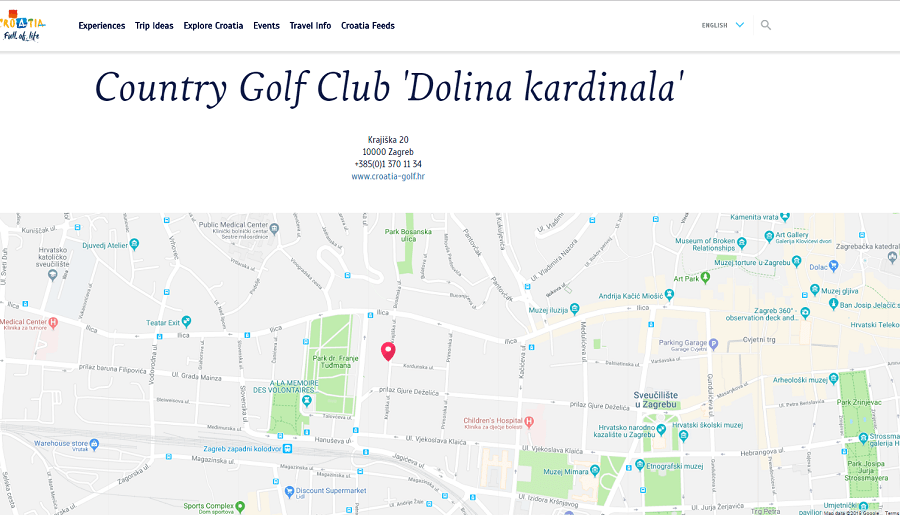
I am very grateful for the media support of my Croatian media colleagues when they have the time and interest to promote these issues, as they are more likely to bring change.
I do have some successes while acting alone, but not many. They are usually when the substance of what I highlight is so totally out of control that even the uhljebs realise they should put the next coffee break on hold to fix the issue.
Examples of this include the national tourist board promoting a full 18-hole golf course in the centre of Zagreb (the fact that the actual course closed in 2012 and was nowhere near Zagreb is another topic of discussion).

Also when the national tourist board was cashing in on all the global interest in Croatia thanks to Game of Thrones, they decided after my article that perhaps an exhibition of old fruits in Zagorje was not top of the list of priorities for people wanting to know how to get to Kings Landing.
I could do these articles all day, every day, as there is SO much material. They are popular, and people like to cheer and congratulate me on getting things like bus timetables updated.
But I don't feel any joy in it at all, as funny as I can write the articles. They depress me more than anything else I do at TCN, because there is so much energy wasted in this, when we should all be focusing on promoting the best of this wonderful country.
It is easy to label all those who work in the ministries and tourist boards as incompetent. But that is also one of the depressing things.
They are not. Many are highly educated, have MBAs, have been educated in North America and Western Europe. They are proud Croats and love their country. Great people to hang out with and have meaningful discussions about tourism and the future of Croatia. If anyone was in a position to effect change, it is them.
And yet...
That is the most depressing thing, and it overshadows any clickbait fun.
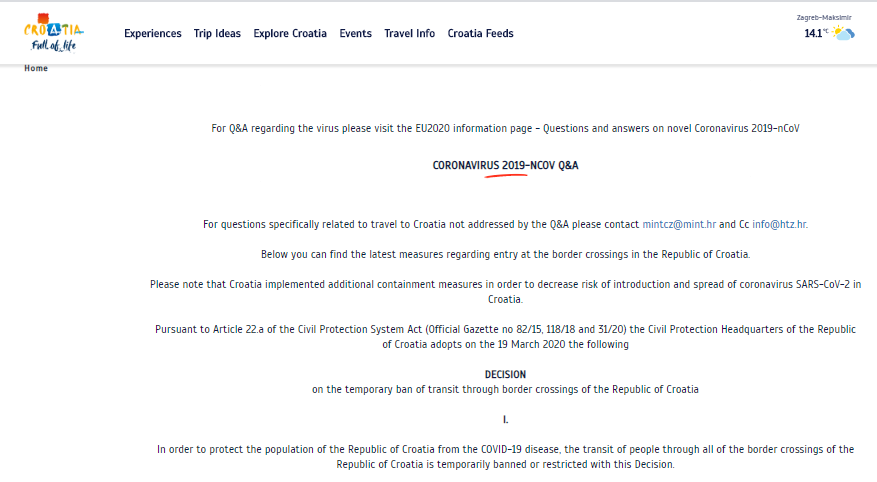
But we will keep trying, as it seems the national tourist board also took note of Index yesterday - no more 'Pursuant to Article 22a of the Civil Protection System Act (Official Gazette no 82/15, 118/18 and 31/20) in answer to the question 'can we come to Croatia?' - above. Replaced by some half-useful info below.
If anyone is reading from CNTB, maybe add the link to the EU2020 information page you mention in the opening sentence. Not everyone knows where to find it - myself included.
Milanović Says Is Neutral in Election but Won't "Go under a Quilt"
ZAGREB, May 9, 2020 - President Zoran Milanović said on Saturday he was completely neutral ahead of the coming parliamentary election but he would not "go under a quilt and look with a periscope at what is happening" because that was not why he was elected.
The president said he hoped the election would not undermine the pace of coming out of the epidemiological restrictions imposed because of COVID-19, and noted that for the next three to four months, after parliament was dissolved, Croatia would probably be without a government.
"I'm totally neutral. I just found out that a left coalition has been formed. I talk with both the prime minister and people from the opposition, some have expectations, but there is no bias on my part."
Milanović said he did not have the right to say what would suit him more after the election and wondered "if the president should vote in elections at all, as is the case in some countries."
He went on to say that he would not attend a commemoration for Croatian soldiers and civilians killed at the end of World War II at Bleiburg, Austria because "the Bleiburg victims don't exist as such, rather there are victims of showdowns and executions which ensued after the surrender of the Nazi army and their servants."
"Thousands of people were caught in a double bind, mostly in Tezno, Slovenia, and that's where I will lay wreaths."
The president said he objected to Bleiburg being associated with the Way of the Cross, viewing it as "an inappropriate and crude use of the sacrifice Jesus made for humankind."
Milanovic said he would not attend a commemoration organised by the Bleiburg Guard of Honour.
"That has nothing to do with honour. It's led by a man who served time in Germany from 1984 to 1991 for first degree murder. They are not people who should come near us. Neither is the man who was in front of the prime minister in Okučani, who was tried by Croatian courts for killing civilians from a basement. Although convicted, he got away with it due to an error by the state prosecutor's office," the president said.
"Once, they were people in wheelchairs who I can sympathise with. Now they are people whom the Croatian judiciary tried for war crimes, yet they push them one metre in front of the prime minister," he added.
The president said he was dissatisfied that there was no ban on commemorations of war criminals such as Vukasin Šoškočanin in Borovo Selo. "A cemetery is not a private place and you can't put just anything on a tombstone. The state can and must regulate that if it wants to. If it's scared of someone and a constant conflict suits it, then it won't."
"Those who put it there should remove that for the sake of good relations between the Croatian and Serb communities," the president added.
More election news can be found in the Politics section.
Restart Coalition Says It Is Team for Defending Croatia from HDZ
ZAGREB, May 9, 2020 - Leaders of five opposition parties on Saturday presented the Restart Coalition in which they will run in the coming parliamentary election, announcing a new start for Croatia and the defence of the country against the ruling Croatian Democratic Union (HDZ).
The Restart Coalition comprises the Social Democratic Party (SDP) led by Davor Bernardić, the Croatian People's Party (HSS) of Krešo Beljak, the Croatian Pensioner's Party (HSU) of Silvano Hrelja, the Civil and Liberal Alliance (GLAS) headed by Anka Mrak Taritaš, and the Civil Activism Party (SNAGA) of Goran Aleksić.
"Croatia needs a restart more than ever, a new beginning on sound foundations, this time without corruption, justly, not with cronyism, with competent ones, not parasites. Our name is our programme, a complete restart of Croatia," Bernardić said at a press conference.
He said people were hopeless and that over a million lived on the brink of poverty.
"Due to numerous scandals and debts, healthcare is facing a total collapse, the education reform is non-existent, the security system is lagging, the state apparatus is overstaffed and doesn't fulfil its purpose. The situation in the judiciary has never been worse. Corruption has seeped into every pore of our society," said Bernardić.
"More than half the government had to go due to suspicion of corruption and it is still in power thanks to political corruption, to the buying of members of parliament, which has destroyed people's faith in the system and institutions," he added.
Bernardić said that when they came to power they would reduce the number of ministries, towns and municipalities as well as the inefficient state administration, and digitise the country and all public services and processes so that the state administration was as close to citizens as possible, but without corruption.
"We will fight corruption by all means, changing laws, making punishment stricter as well as reforming the judiciary, education and healthcare," he said, adding that they would release Croatia's huge potential, boosting industry and exports, relaxing the tax burden on labour and stimulating investment.
"We believe in a new policy, a policy of honesty, courage and trust, a policy and a government which works for citizens, not for itself. We don't want to just turn over a new leaf in our history but write a completely new book, building a strong country," Bernardić said, announcing a new start for Croatia with no more lies, corruption, betrayal and deceit.
He said that in the Restart Coalition they were not distributing positions but concentrating on the platform and a fundamental agreement on jointly running in the election and restarting Croatia "so that Croatia can have a shot at success and the children being born today a shot at a better life."
Bernardić said slates would be discussed when coronavirus restrictions were lifted and election rallies possible. The candidate for prime minister will be the president of the biggest coalition party and the party which wins the most votes, he added.
Beljak said Croatia had needed a new start long before the current crisis and that this crisis had brought to light all of Croatia's problems. "Our coalition has enough know-how, experience, quality and political battles behind it to be able to finally get Croatia started."
Beljak said the HDZ had brought Croatia to the brink of destruction and that it should be opposed. We are the new start, he added.
Mrak Taritaš said the coalition represented a team for the defence of Croatia from the HDZ. "When Croatia had to be pulled out of the biggest crises and abysses the HDZ threw Croatia into, we were the ones who brought our country back to the right path, the path of development, recovery and a functioning state."
She said it was no coincidence that the coalition was formed on Victory Day and Europe Day because this symbolised the Croatia they wanted. Croatia can and deserves to be a country which is not chained by the corruption and incompetence with which the incumbent government is keeping it at the bottom, she added.
Hrelja said Croatia was barely surviving today and that this did not bode for a good and bright future. His party's focus as part of the Restart Coalition will remain on the pension and healthcare systems as well as labour, he added.
Aleksić said he was confident the coalition would take responsibility for Croatia in the coming parliamentary election because it deserved to given its track record in parliament.
The coalition is talking with many county and municipal heads as well as mayors and regional parties such as the PGS and the IDS. Next week it will sign an agreement with Bjelovar-Bilogora County head Damir Bajs.
More elections news can be found in the Politics section.
New Bus Timetables Between Croatian Cities from May 11, 2020: An Overview
May 9, 2020 - Certain travel restrictions will be relaxed on Monday - here is where to (and not to) find information on the new bus timetables between Croatian cities.
The corona crisis has been a truly fascinating topic to report on these last few months, and it has been easily the most challenging thing to cover in the five years of TCN. It has brought both hope and despair, although sadly not in equal measures.
But let's start with the hope. The crisis management and communication of Team Vili has been outstanding from the very first moment. Here is a minister seemingly who is more interested in doing his job and serving the people than lining his own pockets. The outstanding leadership has been mirrored all along the official response - the Viber group, Andrija the app, the excellent Koronaovirus.hr website.
The official response has been mirrored by IT experts in the private sector. The geniuses over at Velebit.ai have produced outstanding data with updated info for almost everything you could need regarding the crisis.
Together - this private sector innovation and public sector dedication and communication - gives us a mouthwatering glimpse of how this country could function if we got rid of the big elephant in the room beginning with U.
And sadly, as soon as one leaves the crisis zone being handled by Team Vili, we come back to the depressing reality on the streets of Uhljebistan.
As we explored recently in Does Croatia Actually Want Tourists? How the Competition is Updating Visitors, official travel information for tourists is embarrassingly bad from those who are paid very well to provide it. In some ways I don't mind, as it brings a ton of traffic to TCN on the articles (such as our latest travel update) we do to make things easier for those wanting to visit.
There are some big changes coming to internal travel on Monday, May 11 - 2 days away. Among the latest wave of relaxed measures, national bus routes will start up again. So where to find the information about which routes are operating and when?
If I wasn't living in the Kingdom of Accidental Tourism, I might start my search on the Arrivals page of the national tourist board. As I do live in the Kingdom of Accidental Tourism, I knew I would find little of use, but decided to see how hard the Kings are working to inform visitors (both future ones once the borders are open, and those who are in Croatia already) about the new bus timetables. This is what I found on the Croatian National Tourist Board's Arrive by Bus page, as well as a link to a sub-page to the bus stations of Sibenik, Rijeka, Pula, Split, Dubrovnik, Zadar, Osijek and Zagreb. If you want to go from Varazdin to Makarska, for example, good luck. There isn't even a friendly fax number to contact.
Thankfully, there are other private businesses to compensate for the official incompetence. And when it comes to information on the new bus timetables, a big gold star and a chocolate biscuit for the team from GetByBus:
Best regards,
Click on the link above and it will take you to a very detailed overview of bus timetables from Monday. Sretan Put!
For the latest corona news, check out the dedicated TCN section.
Letovi prema Hrvatskoj nakon korone: Max Oldorf iz ch-aviation
9. svibnja 2020. - Kako će izgledati budućnost letova prema Hrvatskoj u svijetu nakon korone? TCN o tome razgovara s Maxom Oldorfom, izvršnim direktorom (COO) kompanije koja se bavi podacima u zrakoplovnom prometu, ch-aviation.
Jedna od najvećih nepoznanica u svijetu velikih nepoznanica u kojem sad živimo je kako će izgledati budućnost putovanja, posebice u kontekstu zrakoplovnih putovanja. Hoće li zrakoplovne kompanije preživjeti, hoće li preživjeti niskotarifne kompanije, što će se dogoditi s letovima između kontinenata? I što očekivati od letova prema Hrvatskoj s ključnih tržišta kasnije ove godine i sljedeće godine?
Jedna od osoba koja na ta pitanja može dati bolje odgovore od većine drugih ljudi, kako o pitanjima budućnosti te industrije a tako i o pitanjima letova u Hrvatsku je Max Oldolf, jedan od osnivača švicarske kompanije ch-aviation. Ta kompanija podatke o kretanjima u industriji prodaje svojim klijentima diljem svijeta: zračnim lukama, zračnim prijevoznicima i drugima. Oldorf redovito posjećuje Zagreb, jer je kompanijina najveća podružnica u hrvatskom glavnom gradu - o tome pročitajte više u ovoj TCN-ovoj priči na engleskom jeziku.
Zrakoplovna industrija doživjela je ogromnu promjenu u posljednjih par mjeseci, a posljedice će se osjećati godinama. Kako će se to odraziti na najveće igrače na hrvatskom tržištu? Prije svega, pogledajmo tržište interkontinentalnih letova, koje se u Hrvatskoj razvija posljednjih godina. American, Qatar (za Dubrovnik), Emirates, Air Canada - svi su svoje planove za 2020. odgodili za sljedeću godinu. Hoće li se vratiti?
Općenito, moramo prihvatiti da će svijet od sada nadalje izgledati drukčije, pa mislim da ćemo jednostavno morati živjeti s novom normalom. Neki od ovih letova možda će se vratiti u sljedeće dvije godine, a neke od njih nećemo nikada više vidjeti. Mislim da je dosta izvjesno da ćemo ove godine vidjeti vrlo nizak broj, blizu nuli, interkontinentalnih letova. Ako ne bude drugog i sljedećih valova, možda se neki od letova vrate već sljedeće godine. Ali, moja preporuka je da se treba koncentrirati na vraćanje domaćih letova, pa onda europskih, pa ako tu sve bude u redu, interkontinentalni će se vratiti u nekom trenutku.
Tržišta Velike Britanije i Skandinavije su važna za Hrvatsku. Norwegian je u problemima, Gatwick se prazni, direktor easyJeta kaže da će vraćati "poput startupa", direktor Ryanaira izjavljuje da ako vlada ne bude plaćala za srednje sjedalo, Ryanair neće letjeti. Stvari izgledaju loše. Kako će se promijeniti tržište jeftinih letova za Hrvatsku iz Velike Britanije i Skandinavije? Što će se dogoditi sa cijenama i učestalošću??
Jedino što nas sad treba zanimati jest hoće li biti turističke ljetne sezone u Hrvatskoj ili ne. Rekao bih da, s najnovijim razvojem situacije, sezonu još ne bi trebalo otpisivati. Mnogim ljudima je dosta lockdowna i jedva čekaju otići negdje na put čim im to ponovo bude omogućeno. Količina putnika bit će malena zbog mjera sigurnosti ili straha koji se uvukao u neke građane, ali općenito mislim da će zrakoplovne kompanije početi letjeti čim im to bude dopušteno i budu imali putnike koje trebaju prevesti.
Što se tiče cijena, u kratkom ćemo roku vidjeti neke zaista dobre ponude za putnike. Zračne kompanije će biti prekapacitirane i Ryanair i Wizzair su već najavili da će se boriti za svakog putnika niskim cijenama, dakle u sljedećih godinu ili dvije vidjet ćemo novi rat cijenama na europskom nebu dok se ne smiri situacija na tržištu..
Jednom rečenicom opišite nam stanje u sljedećim kompanijama, s naglaskom na to kakav odnos od njih možemo očekivati nakon korone prema hrvatskom tržištu..
Ryanair: Za njih se uopće ne brinem. Oni će se vratiti punom snagom čim budu mogli stabilno letjeti. Koliko znam, Ryanair održava svoju flotu u posve operativnom stanju, tako da mogu ponovo krenuti u bilo kojem trenutku.
easyJet: I prije ove krize bili su u sukobu sa svojim dioničarima oko toga jesu li prebrzo rasli u posljednjih par godina. Osnivač, Stelios, nije zadovoljan takvim rastom i izjavio je da bi manji easyJet mogao biti profitabilniji. Ova kriza bi ih sad mogla oštetiti, ali ni za njih ne brinem, i oni će se vratiti.
Norwegian: Norwegian je sad već hodajući mrtvac, još uvijek na životu samo zato što su im dioničari i leasing kompanije dali neko vrijeme da se restrukturiraju. Ne računam da će se uopće uskoro vratiti u Hrvatsku.
Eurowings: Mislim da će se oni vratiti slično kao Ryanair i easyJet. Letovi za Hrvatsku dio su njihovog osnovnog biznisa ne-poslovnih putovanja, pa čim se pojavi interes, ponovo će letjeti.
Jet2: Jednako kao i za Eurowings.
Lufthansa: Nešto drukčija situacija, jer se oni ipak koncentriraju na povezanost preko svojih hubova u Frankfurtu i Münchenu, pa imaju više poslovnih putnika od onih koji idu na odmore. Možda u Hrvatsku budu slali manje avione, ali će sigurno biti povezanosti.
BA: Vjerojatno slično kao i Lufthansa, možda će koristiti manje avione.
SAS: Kompanija je iskoristila vrijeme korone da obavi neophodno restrukturiranje, otpuštanje dijela osoblja i slično. Očekujem da će se vratiti. U kojem obliku, to ćemo tek vidjeti.
Croatia Airlines nakon korone?
Croatia Airlines je tijekom ove krize pokazala zašto je bitno imati nacionalnu zrakoplovnu kompaniju. Pružili su ključnu liniju za Frankfurt, letjeli do Kine da bi dovezli zaštitnu opremu, obavili mnoštvo letova kojima su vratili hrvatske državljane u zemlju i slično. Hrvati zaista mogu biti ponosni na svoju zrakoplovnu kompaniju, jer je to nešto s čime bi se Hrvatska zaista mučila da nisu imali nacionalnu kompaniju koja funkcionira.
Imat će također i ključnu ulogu u oporavku hrvatskog gospodarstva, jer će imati mnogo bolju povezanost nego druge zemlje u regiji kad se ukinu ograničenja kretanja. Ali, to je nešto što je propast Adria Airwaysa već drastično pokazala. Adria je propala i nitko nije preuzeo njihove napuštene linije iz Ljubljane. Bilo je povećanja broja letova prema većim hubovima, ali mnoge direktne linije su ipak izgubljene.
Zato je Croatia Airlines toliko bitna za razvoj Hrvatske, pružaju direktne linije koje nitko drugi ne bi pružao. Važno je i da oni plaćaju porez u Hrvatskoj, pa iako im Vlada mora pomoći s vremena na vrijeme proračunskim novcem, taj se novac uvijek vrati, kroz poreze, dodanu vrijednost za zemlju i slično. Jedino što bi Croatia Airlines trebala je pronaći većeg partnera da bi se koristili sinergijski učinci, smanjili troškovi i slično. Dobar partner bi ih izazivao svakim danom da budu sve bolji.
Slično Swissu kojeg sada u vlasništvu ima Lufthansa i koji je bio premalen da bi bio profitabilan dok je poslovao samostalno, ali s većom količinom novca iza sebe postali su nezaustavljivi. Bio sam baš uzbuđen kad sam vidio da je Aegean zainteresiran za njih. Aegean je fantastična kompanija s pametnim, lean poslovnim modelom koji se može nositi sa sezonalnošću, a čak bi i flote tih dviju kompanija bile 100 % kompatibilne. Nadam se da će se ti razgovori nastaviti kad se sve ovo završi. To bi bio sjajan brak.
Očekujete li da će neke nove kompanije ući na hrvatsko tržište, ili da će neke povećati prisutnost na njemu. Na primjer, Wizzair, koji je dosta aktivan u regiji.
Kao i u svakoj drugoj krizi, neke kompanije će propasti jer su i prije bile u lošem stanju, a druge će u tome vidjeti sjajne prilike. Wizzair je svakako u toj drugoj skupini i sada zaista zauzijamu sve veći dio tržišta. Ulazak Wizzaira na hrvatsko tržište imao bi smisla i vjerojatno će se i dogoditi ako se smanje aerodromske takse na kompetitivnu razinu.
Značajno smanjenje prometa utjecalo je na zračne luke diljem svijeta. Koliko pate hrvatske zračne luke? Koncesija u Zagrebu je već bila kontroverzna. Kako će ova situacija utjecati na to?
Pa, situacija je za sve zračne luke zaista loša, zato će se boriti kao ludi da vrate promet k sebi. Za to se hrvatske zračne luke sada moraju pripremiti. Moraju stvoriti poticaje za kompetitivnost i podržati programe za zrakoplovne kompanije kako bi nastavile dolaziti u Hrvatsku, a ne prebacile svoj promet na druge zemlje u regiji.
Koliki postotak smanjenja prometa očekujete u 2021. u odnosu na 2019. u hrvatskim zračnim lukama?
Rekao bih da je moguće sve između -50 % i sličnog postotka. Trenutačno bih vjerojatno bio sretan kada bi u 2021. imali 20 % pada prometa u odnosu na 2019.
Gledajući prema budućnosti i planirajući, Split bi svakako bio učinkovitiji ako bi imao direktnu liniju prema većem europskom hubu, poput Münchena i Frankfurta, nego sad kad većina prometa ide kroz Zagreb. Što mislite, kolike su šanse da se Split tako poveže s nekim većim europskim hubom?
Mislim da to neće biti jednostavno, jer se Split nosi s mnoštvom sezonskog prometa. Lani su imali 720 tisuća putnika u srpnju, a 35 tisuća u veljači. Svaka kompanija koja bi na to pomišljala morala bi se baviti s tom sezonalnošću. To djelomično ulazi i u vaše pitanje o Croatia Airlinesu i zapravo ističe koliko je ta kompanija bitna za povezanost cijele zemlje. Tijekom ljeta, kad su svi avioni puni, svako može i želi letjeti za Hrvatsku, ali kad dođemo do listopada svi otkazuju letove jer postaju neprofitabilni i ostajete bez pola godine dok ne krene sljedeća sezona. Ako Split želi letove za München ili Frankfurt, to će koštati, i morat će pronaći program koji će pokriti gubitke kompanije od listopada do ožujka. Ako to uspiju napraviti, nešto će se možda dogoditi. Ako ne, ostat će status quo.
Najnovije vijesti iz svijeta avijacije možete pratiti na web stranici ch-aviation.

